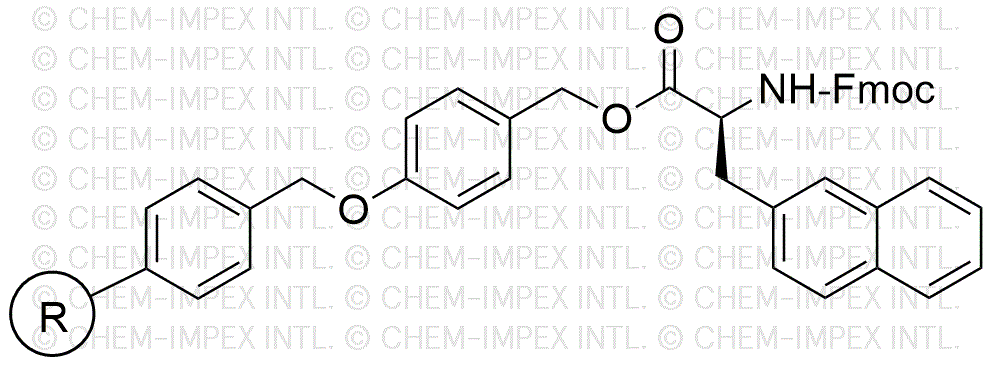Fmoc-3-(2-naphthyl)-L-alanine 4-alkoxybenzyl alcohol resin is widely utilized in research focused on:
- Peptide Synthesis: This resin serves as a solid support for the synthesis of peptides, allowing for efficient coupling and deprotection steps in solid-phase peptide synthesis (SPPS).
- Drug Development: It plays a crucial role in the development of peptide-based drugs, providing a platform for creating novel therapeutic compounds with enhanced efficacy.
- Bioconjugation: The resin can be used to attach peptides to other biomolecules, facilitating the creation of bioconjugates for targeted drug delivery systems.
- Research in Cancer Therapy: Its unique structure allows for the design of peptides that can selectively target cancer cells, making it valuable in cancer research and treatment strategies.
- Material Science: The resin can be utilized in the development of new materials with specific properties, such as improved biocompatibility for biomedical applications.
General Information
Properties
Safety and Regulations
Applications
Fmoc-3-(2-naphthyl)-L-alanine 4-alkoxybenzyl alcohol resin is widely utilized in research focused on:
- Peptide Synthesis: This resin serves as a solid support for the synthesis of peptides, allowing for efficient coupling and deprotection steps in solid-phase peptide synthesis (SPPS).
- Drug Development: It plays a crucial role in the development of peptide-based drugs, providing a platform for creating novel therapeutic compounds with enhanced efficacy.
- Bioconjugation: The resin can be used to attach peptides to other biomolecules, facilitating the creation of bioconjugates for targeted drug delivery systems.
- Research in Cancer Therapy: Its unique structure allows for the design of peptides that can selectively target cancer cells, making it valuable in cancer research and treatment strategies.
- Material Science: The resin can be utilized in the development of new materials with specific properties, such as improved biocompatibility for biomedical applications.
Documents
Safety Data Sheets (SDS)
The SDS provides comprehensive safety information on handling, storage, and disposal of the product.
Product Specification (PS)
The PS provides a comprehensive breakdown of the product’s properties, including chemical composition, physical state, purity, and storage requirements. It also details acceptable quality ranges and the product's intended applications.
Certificates of Analysis (COA)
Search for Certificates of Analysis (COA) by entering the products Lot Number. Lot and Batch Numbers can be found on a product’s label following the words ‘Lot’ or ‘Batch’.
Número de catálogo
Número de lote/lote
Certificates Of Origin (COO)
This COO confirms the country where the product was manufactured, and also details the materials and components used in it and whether it is derived from natural, synthetic, or other specific sources. This certificate may be required for customs, trade, and regulatory compliance.
Número de catálogo
Número de lote/lote
Safety Data Sheets (SDS)
The SDS provides comprehensive safety information on handling, storage, and disposal of the product.
DownloadProduct Specification (PS)
The PS provides a comprehensive breakdown of the product’s properties, including chemical composition, physical state, purity, and storage requirements. It also details acceptable quality ranges and the product's intended applications.
DownloadCertificates of Analysis (COA)
Search for Certificates of Analysis (COA) by entering the products Lot Number. Lot and Batch Numbers can be found on a product’s label following the words ‘Lot’ or ‘Batch’.
Número de catálogo
Número de lote/lote
Certificates Of Origin (COO)
This COO confirms the country where the product was manufactured, and also details the materials and components used in it and whether it is derived from natural, synthetic, or other specific sources. This certificate may be required for customs, trade, and regulatory compliance.

